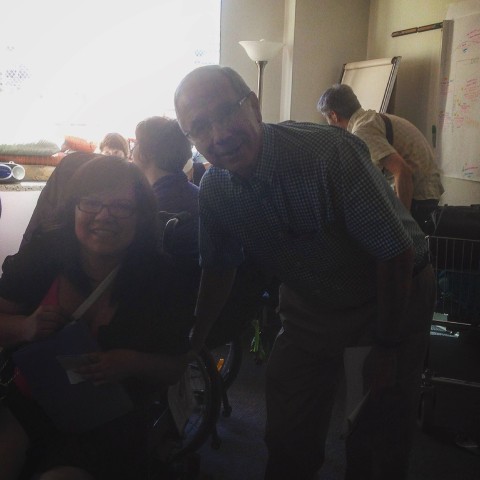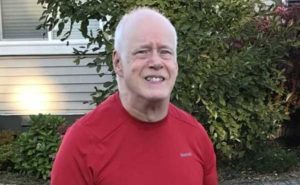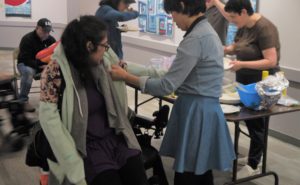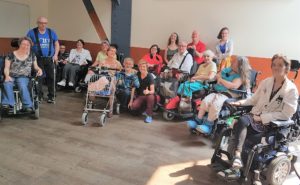By Stacey Francis
On July 6th, 2016 the Youth Without Limits support group was joined by Dr. Richard Beauchamp to engage in a much needed discussion on aging with cerebral palsy (CP). Dr. Richard Beauchamp is an orthopedic surgeon whose main practice surrounds neuromuscular diseases and cerebral palsy. Some of our participants are his former patients, myself included. The conversation was very delightful. What stood out for me in this session was the way in which the conversation played out. Dr. Richard Beauchamp is a medical practitioner and because of that I expected the conversation to have a very medical based perspective. However, the discussion focused on both medical perspectives and social and emotional aspects that surround the topic of aging with a disability.
The need for further research
Throughout the discussion it became apparent that aging with CP is an issue that needs to be researched and explored further. It seems that there is a wealth of research done surrounding children with CP, but there is a lack of research around adults and aging with CP which results in false expectations and perhaps people feeling uneasy about what the future holds. Prior to the group session, I am sure most it not all of the participants wondered about life expectancy and possible health problems. It turns out we do not have to worry so much. Dr. Beauchamp told the group, “once you have made it this far, you’re home free.”
The lack of research into adults and aging with cerebral palsy correlates with a gap in services when transitioning into adulthood and moving forward. Until the age of 18, children and youth with CP are given much support with physio therapy and occupational therapy and surgeries to prevent problems associated with aging with CP. Perhaps because various preventative measures are taken, medical practitioners and society in general create a belief that adults with cerebral palsy will be fine as they grow older because cerebral palsy is a non-progressive disability. Although there is some truth to this notion, people with CP are aging along with everyone else.
 Aging and disability
Aging and disability
According to Dr. Beauchamp, people start to deteriorate in their late teen years and early 20’s resulting in weaker, tight muscles, weight gain and a gradual decrease in overall function. Cerebral palsy itself does not progress, but the normal body changes associated with aging cause mobility to decrease. Getting active and working out in an attempt to counter ageing-related mobility issues can be another challenge altogether, due to environmental barriers. Dr. Beauchamp suggested that the general lack of access to gyms and work-out facilities for people with disabilities is probably contributing to the pain and fatigue that older people with CP experience.
The issue of inaccessibility in gyms and recreational areas is a much-needed area of discussion alongside that of aging with cerebral palsy. Several Youth Without Limits participants have experienced access issues in gyms and other recreational areas, leaving them feeling discouraged from continuing to go to the gym or even the pool. Inaccessibility within environments that are meant to better a person’s overall well-being adds to the ongoing cycle of adults with CP lacking mobility and thus lowering their overall quality of life. Quality of life is a major determining factor in a person’s ability to cope with the effects of ageing with CP and has a strong correlation with mortality rates among people with CP. Aging with cerebral palsy is no longer a determining factor in regards to mortality rates. Intellectual disabilities (not being able to communicate, not being an active member of society) are said to be a single predictor for early mortality among people with CP.
True cause of early mortality
The main thing that I took away from the session and that I will continue to carry with me is Dr. Beauchamp’s main piece of advice in regards to easing the process of aging with cerebral palsy. He gave us no medical fix or treatment; instead he says, “All of you are participating in society and that’s the first major step. You have eliminated one of the predictors for early mortality.”
For everyone struggling with cerebral palsy and getting older, the best piece of advice I can give is to surround yourself with positivity, stay active the best that you can, socialize, laugh, vent, and create a sense of belonging and purpose. There is no medical fix to aging with cerebral palsy. Quality of life is what matters most and is what will keep us all moving forward.

 Aging and disability
Aging and disability “I love it!” – Peter is a CPABC Movement Ambassador
“I love it!” – Peter is a CPABC Movement Ambassador Making an adapted fashion statement – Youth Without Limits
Making an adapted fashion statement – Youth Without Limits Jillian Bleackley: Making dreams come true
Jillian Bleackley: Making dreams come true Fitness, aging and cerebral palsy will be the focus of the “Tea, Talk, and Crumpets” session
Fitness, aging and cerebral palsy will be the focus of the “Tea, Talk, and Crumpets” session

